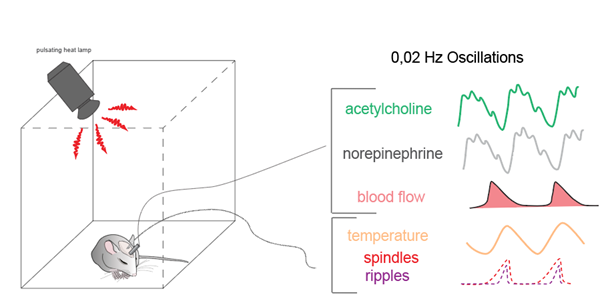Master project - Deciphering the Role of Temperature in Memory Consolidation During Sleep
Have you ever wondered why it's challenging to get a good night's sleep on a warm summer night? Sleep is sensitive to temperature changes, and with climate change affecting our planet, maintaining quality sleep becomes a concern.
Quality sleep is crucial for cognitive performance and memory, yet the exact mechanisms remain mysterious. Sleep involves different stages, with Non-Rapid Eye Movement (NREM) being the most prevalent. NREM exerts its function through oscillatory patterns like spindles and Sharp Waves and Ripples (SWR) which are essential for memory and cognition.
On the other hand, neuromodulators like Norepinephrine and Acetylcholine play key roles in sleep stages, affecting arousal, memory, learning, and cognition. Recent research links EEG characteristics to these neuromodulators, showing their influence on the timing of spindles and SWR during NREM.
Our project aims to explore how changes in ambient temperature impact neuromodulator dynamics and neuronal oscillations. Using advanced methods like fiber photometry and traditional techniques such as local field potential recordings in mouse models, we'll investigate these effects in both healthy and diseased subjects.
By examining the role of ambient temperature, this project addresses the impact of climate change on sleep and cognition, providing insights into how individuals can safeguard their well-being in a constantly warming world. Join us in unraveling the mysteries of sleep and advancing our understanding of both circuits underlying natural sleep and the effects of climate change on our health.

Our center (https://ctn.ku.dk/) is led by professor Maiken Nedergaard and Steve Goldman and is situated at the Panum Institute. It is a dynamic international research environment with more than 40 people working on various projects centered on glial cells in the brain. The center is very resourceful with a range of different techniques and methods available.
If you want to learn more, feel free to contact associate professor at Center for Translational Neuromedicine, Celia Kjærby (celia.kjaerby@sund.ku.dk) or PhD student Anastasia Tsopanidou (anastasia.tsopanidou@sund.ku.dk).
